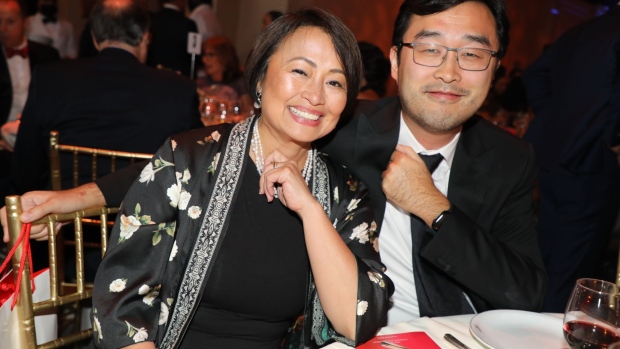May 12, 2022
KKR’s Night Out Sees Co-CEO Joe Bae Joined by ‘Squid Game’ Star
, Bloomberg News

(Bloomberg) -- Joe Bae has come a long way since he arrived in Flushing, Queens, as a boy from Seoul whose parents spoke little English.
Just how far was clear at the Korean American Community Foundation gala Wednesday night, which, with Bae’s assistance, raised more than $4 million to help the roughly one-in-four Koreans who live below the poverty line in New York City.
Bae, the co-chief executive officer of KKR & Co., was one of the honorees, along with Lee Jung-jae, the star of “Squid Game,” and Michelle Zauner of indie band Japanese Breakfast, who also authored the bestselling “Crying in H Mart.”
But while these pop-culture figures needed little introduction, Bae got a particularly demonstrative one from Alex Chi, a senior executive at Goldman Sachs.
Chi recalled an outing to a steakhouse led by Bae, where the solicitous sommelier took the group down to the cellar to see rare, off-menu wines.
“Joe was not that impressed,” Chi said.
Two months later, Chi went back to that same restaurant -- without Joe -- and as soon as they sat down, his group’s glasses were filled with a fantastic wine that impressed all of Chi’s guests. Until the sommerlier circled back and asked, “‘So what did you think of that bottle of wine, Mr. Bae?’ When we got the bill, that’s when I really wanted to be Joe Bae.”
Bae’s ascent to the top is an arc that many people in the room have shared to one extent or another. When Bae was a boy, there was no Korean American Community Foundation, and there were few Korean Americans on Wall Street.
That has changed. As has the cultural place of Koreans.
“I remember growing up in America feeling like an outsider,” Bae said. “The focus was on assimilation, the focus was on fitting in and not drawing attention to yourself. I grew up in an America where it was definitely not cool to be Korean, which predates BTS, the explosion of Korean dramas, Chloe Kim, Michelin-star Korean BBQ restaurants, and of course ‘Squid Game.’”
These gains, however, have not eliminated the stresses on Asian Americans, Bae said. There is poverty, particularly among elderly Asian Americans in New York. Language barriers often prevent people from getting help and there’s stigma around domestic abuse and mental health.
Founded 20 years ago, the Korean American Community Foundation has given grants and assistance to nonprofits that help with food insecurity, housing and health care. It has distributed a total of $10 million, including almost $3 million in the past two years.
Bae didn’t just drop in as honoree and champion. His mother, a Presbyterian minister and social worker, volunteered at an agency supported by the foundation, providing counseling to domestic violence victims. One of his sons has interned for two years at the foundation.
“The generation that came before us paved the way for us to reach where we are today,” Bae said. “It’s by standing together and helping each other that we can most successfully and collectively realize the American Dream.”
The room at Cipriani Wall Street was an expression of Asian-American success across fields. Among those in attendance: TV anchor Juju Chang; artist Anicka Yi; Peng Zhao, CEO of Citadel Securities; Mike Joo of Bank of America; Michael Chung of Millennium; Sarah Min, who’s on President Joe Biden’s Advisory Commission on Asian Americans; Miky Lee, the Samsung heiress who brought us “Parasite;” and Lenzo Yoon, the man responsible for K-pop sensation BTS.
As for the famous honorees, they focused on the responsibility they bear to represent Korean culture to the rest of the world.
“There is something profound and healing in stories that show our community in all its complexity,” Zauner said.
The 900 guests included 80 or so KKR employees.
“I think half of you should be actually in the office working,” Bae said from the podium.
©2022 Bloomberg L.P.


